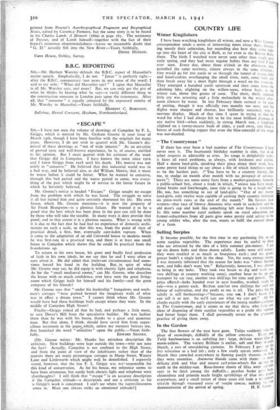ESCAPE "
Sta,—I have not seen the volume of drawings of Campden by F. L. Griggs, which is noticed by Mr. Graham Greene in your issue of March tath, though I have been familiar with the originals for many years. However, I do not wish to quarrel with Mr. Greene's dis- missal of these drawings as " not of wide interest." As an art-critic of proved taste and well-known experience, he is, of course, entitled to his opinion. But I must quarrel with his estimate of the work that Griggs did in Campden. I have known the town since 1916 and I knew Griggs from 1918 until his death. His motive was not solely to "conserve." He believed that this industrial world was in a bad way, and he believed also, as did William Morris, that it-must be worse before it could be better. What he wanted to conserve, through this bad period and the worse period to come, was every- thing of the past which might be of service to the better future in which he fervently believed.
Mr. Greene's notice is headed " Escape." Griggs sought no escape from the problem with which he was faced. The struggle to solve it all but ruined him and quite certainly shortened his life. His own house, which Mr. Greene mentions—it is now the property of Sir Frank Brangwyn—is a glorious failure. He wanted it to be a proof that the best which has been done in the past can still be done by those who will take the trouble. In many ways it does provide that proof, and to that extent it is a glorious success. What is wrong with it is due to the fact that he had had no experience of domestic archi- tecture on such a scale, so that this was, from the point of view of practical detail, a first, fine, eventually care-laden rapture. When it came to the adaptation of an old Cotswold house to modern needs he was first-rate in a practical way, and there is at least one small house in Campden which shows that he could be practical from the foundations up.
To return to his own house, his great and finally fatal profession of faith in his own ideals, let me say that he and I were often at outs about it. He did admit that irrelevant circumstances had -some- times forced his hand in the building. But, in spite of what Mr. Greene may say, he did equip it with electric light and telephone. As for the " small mediaeval rooms," can Mr. Greene, who describes the house with so much confidence, ever have seen the great living- room which Griggs built for himself and his family—and the great company of his friends?
Mr. Greene says that " under his leadership " bungalows and work- men's cottages " were pushed beyond the imaginary walls of what was in effect a dream town." I cannot think where Mr. Greene would have had these buildings built except where they were. In the middle of Campden High Street?
Finally—Griggs risked all that he had, and perhaps a little more, to save Dover's Hill from the speculative builder. He was luckier there than he was with his house, thanks to a great and generous man. But that alone, I think, should have saved him from super- cilious treatment in the papes,which, unless my memory betrays me, first launohed the word " amenities " upon the public.—Yours faith-
fully, EDWARD SHARKS.
[Mr. Greene writes: Mr. Shanks has mistaken description re criticism. New buildings were kept outside the town—why not note the fact? Actually, Campden is not confined to the High Street, and from the point of view of the inhabitants rather than of the tourists there are many picturesque cottages in Sheep Street, Watery Lane and Littleworth which might well be demolished. I expressly stated, however, that the late F. L. Griggs was not • responsible for this kind of conservation. As for his house, my reference seems to have been erroneous, but surely both electric light and telephone were afterthoughts? I still think that " escape " is an accurate description 3f the Campden attitude—a description and not a criticism as far Is Griggs's work is concerned. I can't see where the superciliousness tomes in. Must one always strike an emotional attitude?]






































 Previous page
Previous page